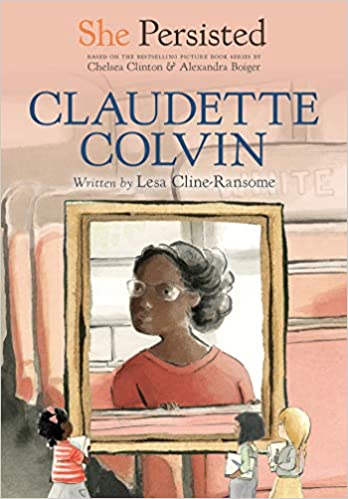
Buy This Book Buy This Series
“Harriet Tubman’s hands were pushing down on one shoulder and Sojourner Truth’s hands were pushing down on the other shoulder . . . I couldn’t move.” Claudette Colvin, –Lesa Cline-Ransome
She Persisted: Claudette Colvin
by Lesa Cline-Ransome
AR Test, Diverse Characters, Strong Female
6+
Score
6.3
80
Children are often taught about Rosa Parks refusing to give up her seat on the bus, but before her, there was Claudette Colvin, a teenage girl from Montgomery, Alabama. Strongly influenced by her Christian upbringing and her staunch belief in racial equality, Claudette Colvin was almost the face of the Civil Rights Movement in the United States. The chapter book She Persisted: Claudette Colvin recounts her life and her impact on the Civil Rights Movement.
Born in Alabama and sent to live with her aunt and uncle at a young age, Claudette spent a lot of her time at church, so much so that when she would play with her sister, they would pretend to be at church. For Claudette, who lived in the Jim Crow-era south, the church touted the importance of being a good person, of perseverance and equality. These tenets in Claudette’s life became even more pronounced after her sister’s death from polio, and these themes are strongly referenced throughout the book. For instance, in the wake of Delphine’s death and the end of segregation in schools, Claudette “was learning there were plenty of other ways she could fight.”
When Claudette was 15 years old she moved to a new high school. New bus laws had been enacted, but this did not mean that white people necessarily followed them. One day Claudette was sitting on the bus when the bus driver demanded that she give up her seat to a white passenger. Knowing the law and her rights, Claudette refused. Quickly, she was removed by several police officers who treated her poorly, using racial slurs and violence. Claudette did not fight back.
The local government and police force were against Claudette, but the local chapter of the NAACP worked to build a case for Claudette to fight this injustice. Her case sparked a massive bus boycott in Montgomery. Despite their efforts, Claudette was found guilty of breaking the law. Just nine months after Claudette’s case, Rosa Parks refused to give up her seat on the bus as well.
To help keep readers engaged, the book has short chapters and black-and-white illustrations that appear every three to five pages. Kids may need help understanding certain references in the book such as the NAACP, Rosa Parks, and the United States Constitution. Despite this, Claudette’s story is one that kids will be able to understand as it is fundamentally about fairness, justice, and equality.
The Montgomery of Claudette’s childhood would look very different after she took a stand that day since her actions helped lead to desegregation on buses. Claudette’s fearless behavior is inspirational, and this book gives a great example of a young girl standing up for what is right rather than doing what is expected of her. Much like the other She Persisted books, there is a list of ways to be like Claudette in the back of the book, including, “Know your rights. Visit your local library and ask for help in learning more about state and local laws,” and, “Read a copy of the Constitution.” Claudette Colvin’s story is less known than Rosa Parks’, but Claudette is worth reading about at any age. Readers who want to learn more about the civil rights movement should also read A Girl Named Rosa by Denise Lewis Patrick. Readers can find more inspirational stories in Bold Women in Black History by Vashti Harrison.
Sexual Content
- None
Violence
- Claudette is arrested for refusing to give up her spot on the city bus. The narrator describes, “One of the officers grabbed her hands, the other grabbed her arm and they pulled her out of her seat and into the aisle. Her schoolbooks tumbled onto the floor. As they dragged her backward down the aisle and off the bus, one of the officers kicked her.” This event is described over several paragraphs.
- The narrator describes how the boycott on the city buses ended in Montgomery. “To intimidate them…protestors were fired from jobs, received death threats, and were even bombed in their homes. Many were the victims of violence.”
- Claudette is arrested and put in a police car. “Crying Claudette became more and more afraid as she listened to officers of the law call her every horrible word white people called Black people.”
Drugs and Alcohol
- None
Language
- When Claudette is unfairly found guilty, there is a newspaper headline that reads, “Negro Girl Guilty of Violation of City Bus Segregation Law.”
Supernatural
- None
Spiritual Content
- Religion was a large part of Claudette’s formative years. The narrator mentions that “Reverend H.H. Johnson traveled from Montgomery to Pine Level to preach the Sunday service on what folks called Big Meeting Sunday. From midday to well after dark, Claudette sat with her parents in the pews through regular service, selections from the choir and the glee club, Reverend Johnson’s afternoon sermon, early supper, Reverend Johnson’s evening sermon and a late supper.”
- As a child, Claudette loved church so much that she “set up chairs in her backyard, sang hymns, read scripture and shouted out sermons with her best friend.”
- The narrator says Claudette Colvin “loved learning and God in equal measure.”
- Claudette wonders, “When [her dog] dies, will she go to heaven?”
- Racism and religion meet when Claudette is little. The narrator notes, “In Sunday school, the Bible taught that God created everyone equal, but Claudette wondered, why aren’t Black people treated as equals?”
- Passages from different prayers are included in the book. For example, Claudette prays the beginning of the Lord’s Prayer, saying, “Our Father, who art in heaven / hallowed be thy name. / Thy kingdom come, / thy will be done…”
- When Claudette’s sister, Delphine, dies of polio, Claudette questions God and asks, “Why Delphine?”
- At church, Reverend Johnson “led the entire congregation in prayer for the young woman who stood up to racism.”
- Before testifying in court, Claudette “bowed her head in prayer.”
“Harriet Tubman’s hands were pushing down on one shoulder and Sojourner Truth’s hands were pushing down on the other shoulder . . . I couldn’t move.” Claudette Colvin, –Lesa Cline-Ransome
Latest Reviews

A Tale of Magic

The Immortal Fire

Grace Hopper: Queen of Computer Code

Girls Who Code: Learn to Code and Change the World

Alone

Friends Fur-Ever

Harry Houdini: A Magical Life

The Greedy Gremlin

Hoop Genius: How a Desperate Teacher and a Rowdy Gym Class Invented Basketball






